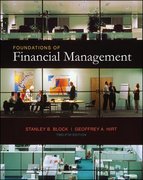Answered step by step
Verified Expert Solution
Question
1 Approved Answer
I only need 7-11 answered. thank you ncial Assets 7-8 YIELD TO CALL Seven years ago the Templeton Company issued 20-year bonds with an with

I only need 7-11 answered. thank you
ncial Assets 7-8 YIELD TO CALL Seven years ago the Templeton Company issued 20-year bonds with an with 5 years of call protection. Today Templeton called the bonds. Compute the realized rate of return for an investor who purchased the bonds when they were issued and held them until they were called. Explain why the investor should or should not be happy that Templeton called them. 7-9 YIELD TO MATURITY Harrimon Industries bonds have 6 years left to maturity. Interest is paid annually, and the bonds have a $1,000 par value and a coupon rate of 10%. a. What is the yield to maturity at a current market price of (1) $865 and (2) $1,166? b. Would you pay $865 for each bond if you thought that a "fair" market interest rate for such bonds was 12%-that is, ifr, - 12%? Explain your answer. 7-10 CURRENT YIELD, CAPITAL GAINS YIELD, AND YIELD TO MATURITY Pelzer Printing Inc. has bonds outstanding with 9 years left to maturity. The bonds have a 9% annual coupon rate and were issued 1 year ago at their par value of $1,000. However, due to changes in interest rates, the bond's market price has fallen to $910.30. The capital gains yield last year was -8.97%. a. What is the yield to maturity? b. For the coming year, what are the expected current and capital gains yields? (Hint: Refer to footnote 6 for the definition of the current yield and to Table 7.1.) c. Will the actual realized yields be equal to the expected yields if interest rates change? If not, how will they differ? 7-11 BOND YIELDS Last year Carson Industries issued a 10-year, 13% semiannual coupon bond at its par value of $1,000. Currently, the bond can be called in 6 years at a price of $1,065 and it sells for $1,200. a. What are the bond's nominal yield to maturity and its nominal yield to call? Would an investor be more likely to earn the YTM or the YTC? b. What is the current yield? Is this yield affected by whether the bond is likely to be called? (Hint: Refer to footnote 6 for the definition of the current yield and to Table 7.1.) c. What is the expected capital gains (or loss) yield for the coming year? Is this yield dependent on whether the bond is expected to be called? Explain your answer. 7-12 YIELD TO CALL It is now January 1, 2018, and you are considering the purchase of an outstanding bond that was issued on January 1, 2016. It has an 8% annual coupon and had a 30-year original maturity. (It matures on December 31, 2045.) There is 5 years of call pro- tection (until December 31, 2020), after which time it can be called at 108-that is, at 108% of par, or $1,080. Interest rates have declined since it was issued, and it is now selling at 119.12% of par, or $1,191.20. a. What is the yield to maturity? What is the yield to call? b. If you bought this bond, which retum would you actually earn? Explain your reasoning. c. Suppose the bond had been selling at a discount rather than a premium. Would the yield to maturity have been the most likely return, or would the yield to call have been most likely? 7-13 PRICE AND YIELD A 7% semiannual coupon bond matures in 4 years. The bond has a face value of $1,000 and a current yield of 7,5401%. What are the bond's price and YTM? (Hint: Refer to footnote 6 for the definition of the current yield and to Table 7.1.) 7-14 EXPECTED INTEREST RATE Lourdes Corporation's 12% coupon rate, semiannual $1,000 par value bonds, which mature in 25 years, arr mallah Step by Step Solution
There are 3 Steps involved in it
Step: 1

Get Instant Access to Expert-Tailored Solutions
See step-by-step solutions with expert insights and AI powered tools for academic success
Step: 2

Step: 3

Ace Your Homework with AI
Get the answers you need in no time with our AI-driven, step-by-step assistance
Get Started


